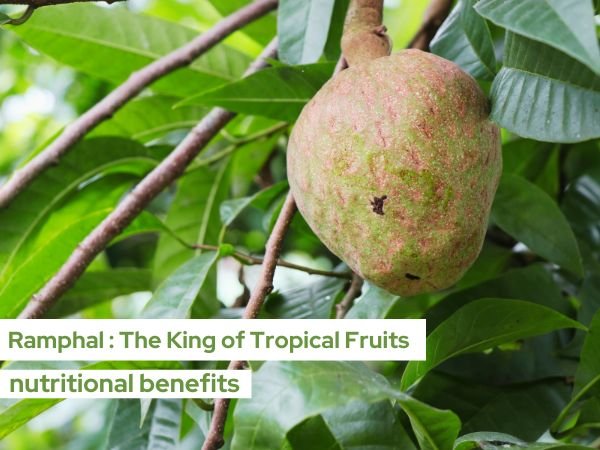Ramphal fruit, also known as bullock’s heart or custard apple, is a tropical fruit that is highly regarded for its unique flavor and numerous health benefits. This fruit, with its green, bumpy skin and creamy, sweet flesh, is native to the Caribbean and South America.

Ramphal fruit is not only delicious but also packed with essential nutrients like vitamins, minerals, and antioxidants. It is known to support digestion, boost immunity, and promote heart health. Whether enjoyed on its own or incorporated into various culinary creations, ramphal fruit is a delightful addition to any diet.
The Origins and Characteristics
The Ramphal fruit, also known as Bullock’s Heart or Annona reticulata, is native to the tropical regions of Central and South America. It earned its regal title due to its impressive size, which can reach up to six inches in diameter, and its rough exterior resembling the intricate patterns on a heart. The fruit boasts a vibrant green outer skin that turns golden-yellow or pale yellow when ripe, giving it a visually enticing appeal.
The flesh of the Ramphal is what truly sets it apart. Upon slicing open the fruit, you will discover a luscious creamy texture, akin to custard. The flavour profile of the fruit is a harmonious blend of sweet and tangy notes, with hints of tropical fruits like mango, pineapple, and banana. The unique combination of flavors makes Ramphal a true delicacy among tropical fruits.
Ramphal fruit benefits
Ramphal fruit, also known as bullock’s heart or custard apple, offers a plethora of health benefits. Packed with essential vitamins, minerals, and antioxidants, ramphal is known to support digestion, boost immunity, and promote heart health. Its high fiber content aids in maintaining a healthy digestive system, while the abundance of vitamin C helps strengthen the immune system. Additionally, the potassium present in ramphal fruit contributes to maintaining optimal heart function. With its delicious taste and numerous health benefits, incorporating ramphal into your diet can be a delightful way to enhance your overall well-being.

Nutritional value
Aside from its delectable taste, Ramphal is also packed with an array of nutrients that promote good health. Here are some of its notable health benefits:
- Rich in Vitamin C: Ramphal fruit is a great source of Vitamin C, an essential antioxidant that helps strengthen the immune system, protect against free radicals, and promote collagen production for healthier skin.
- High Fiber Content: This tropical fruit is loaded with dietary fiber, aiding digestion, preventing constipation, and promoting a healthy gut.
- Potassium Powerhouse: Ramphal fruit contains high levels of potassium, which helps regulate blood pressure and maintain a healthy heart.
- B Vitamins: It is also rich in B vitamins, including thiamine and pyridoxine, which are crucial for energy production and brain function.
“Ramphal fruit mesmerizes the taste buds while nourishing the body with a multitude of health benefits.” – Source
health benefit
Ramphal, also known as bullock’s heart or custard apple, is believed to offer several potential health benefits. Here are some of the commonly mentioned health benefits associated with consuming ramphal fruit:
- Rich in Nutrients: Ramphal fruit is a good source of essential nutrients such as vitamin C, vitamin A, potassium, magnesium, and dietary fiber. These nutrients play a vital role in supporting overall health and well-being.
- Boosts Immunity: The high vitamin C content in ramphal may help strengthen the immune system, which is crucial for fighting off infections and diseases.
- Supports Digestive Health: The dietary fiber present in ramphal fruit can aid in maintaining a healthy digestive system. It may help prevent constipation, promote regular bowel movements, and support a healthy gut.
- Antioxidant Properties: Ramphal fruit contains antioxidants, such as vitamin C and polyphenols, which can help protect the body against oxidative stress caused by free radicals. Antioxidants are known to have potential anti-inflammatory and anti-aging effects.
- Heart Health: Potassium, a mineral found in ramphal, is essential for maintaining heart health. Adequate potassium intake may help regulate blood pressure levels and reduce the risk of cardiovascular diseases.
- Energy Boost: Ramphal fruit is a natural source of carbohydrates, which are the body’s primary source of energy. Including ramphal in your diet may provide a natural energy boost.
It’s important to note that while these potential health benefits are often associated with ramphal fruit, scientific research on the specific effects of this fruit is limited. As with any dietary changes or health concerns, it’s always advisable to consult with a healthcare professional for personalized advice.

Disadvantages and potential side effects
While ramphal fruit is generally considered safe for consumption, there are a few potential side effects to be aware of:
- Allergic reactions: Some individuals may be allergic to ramphal fruit, experiencing symptoms such as itching, swelling, or difficulty breathing. If you have known allergies to other fruits or have experienced allergic reactions in the past, it’s advisable to exercise caution or consult with a healthcare professional before consuming ramphal.
- Digestive issues: Like many fruits, ramphal contains natural sugars and fiber, which can cause digestive discomfort in some individuals. Consuming excessive amounts of ramphal fruit may lead to bloating, gas, or diarrhea. It’s recommended to consume it in moderation and listen to your body’s response.
- Interactions with medications: Ramphal fruit may interact with certain medications, particularly those that are metabolized by specific enzymes in the liver. If you are taking any medications, especially those with known interactions with fruits, it’s best to consult with your healthcare provider to ensure there are no potential issues.
It’s important to note that individual reactions to ramphal fruit can vary, and it’s always a good idea to listen to your body and consult with a healthcare professional if you have any concerns or pre-existing conditions.
Culinary Delights with Ramphal Fruit
Now that we have explored the captivating characteristics and health benefits of Ramphal fruit, let’s delve into its culinary uses. This versatile fruit lends itself beautifully to both sweet and savory dishes, offering endless possibilities in the kitchen.
Sweet Treats with a Tropical Twist:
Ramphal fruit can elevate any dessert with its creamy texture and unique flavor profile. Here are some delightful ways to incorporate this tropical gem into your sweet creations:
1. Ramphal Fruit Custard: Combine the velvety flesh of ripe Ramphal with chilled vanilla custard for a heavenly dessert. The sweet and tangy notes of the fruit beautifully complement the creamy custard, creating a symphony of flavors that will leave your taste buds dancing.
2. Ramphal Fruit Sorbet: Transform the vibrant flavors of Ramphal fruit into a refreshing sorbet. Blend the ripe flesh with a touch of lime juice and a hint of honey. Freeze the mixture and indulge in a tropical delight that will cool you down on a sunny day.
3. Ramphal Fruit Tart: Create a show-stopping dessert by incorporating sliced Ramphal into a classic tart. The unique taste of the fruit adds a delightful twist to this pastry, making it a true culinary masterpiece.
Savory Delights with a Tropical Touch:
The versatility of Ramphal fruit extends beyond sweet treats. Here are some creative ways to incorporate this exotic fruit into savory dishes:
1. Ramphal Salsa
Dice the fruit and combine it with diced tomatoes, onions, jalapenos, lime juice, and cilantro to create a vibrant and tangy salsa. This refreshing accompaniment pairs perfectly with grilled fish or chicken, adding a tropical twist to your meal.
2. Ramphal Fruit Salad
Combine sliced Ramphal fruit with a variety of tropical fruits like mango, pineapple, and papaya for a colorful and refreshing fruit salad. Add a sprinkle of fresh mint leaves and a drizzle of lime juice for an extra burst of flavors.
3. Ramphal Chutney
Blend the ripe fruit with ginger, garlic, lime juice, cumin, and a touch of sugar to create a tantalizing chutney. This aromatic accompaniment pairs well with grilled meats or can be used as a dip for crispy snacks.
“The versatility of Ramphal fruit allows for endless culinary adventures, from sweet desserts to savory delights, ensuring a delightful experience for your taste buds.” – Source
Conclusion
The Ramphal fruit, with its regal appearance and captivating flavor profile, truly deserves its title as the King of Tropical Fruits. Its creamy texture, coupled with a unique blend of flavors, makes it a coveted ingredient in both sweet and savory dishes. Whether enjoyed in a refreshing sorbet or added to a vibrant salsa, Ramphal never fails to delight the palate. So, embark on a tropical culinary journey and let the King of Tropical Fruits reign supreme in your kitchen!
